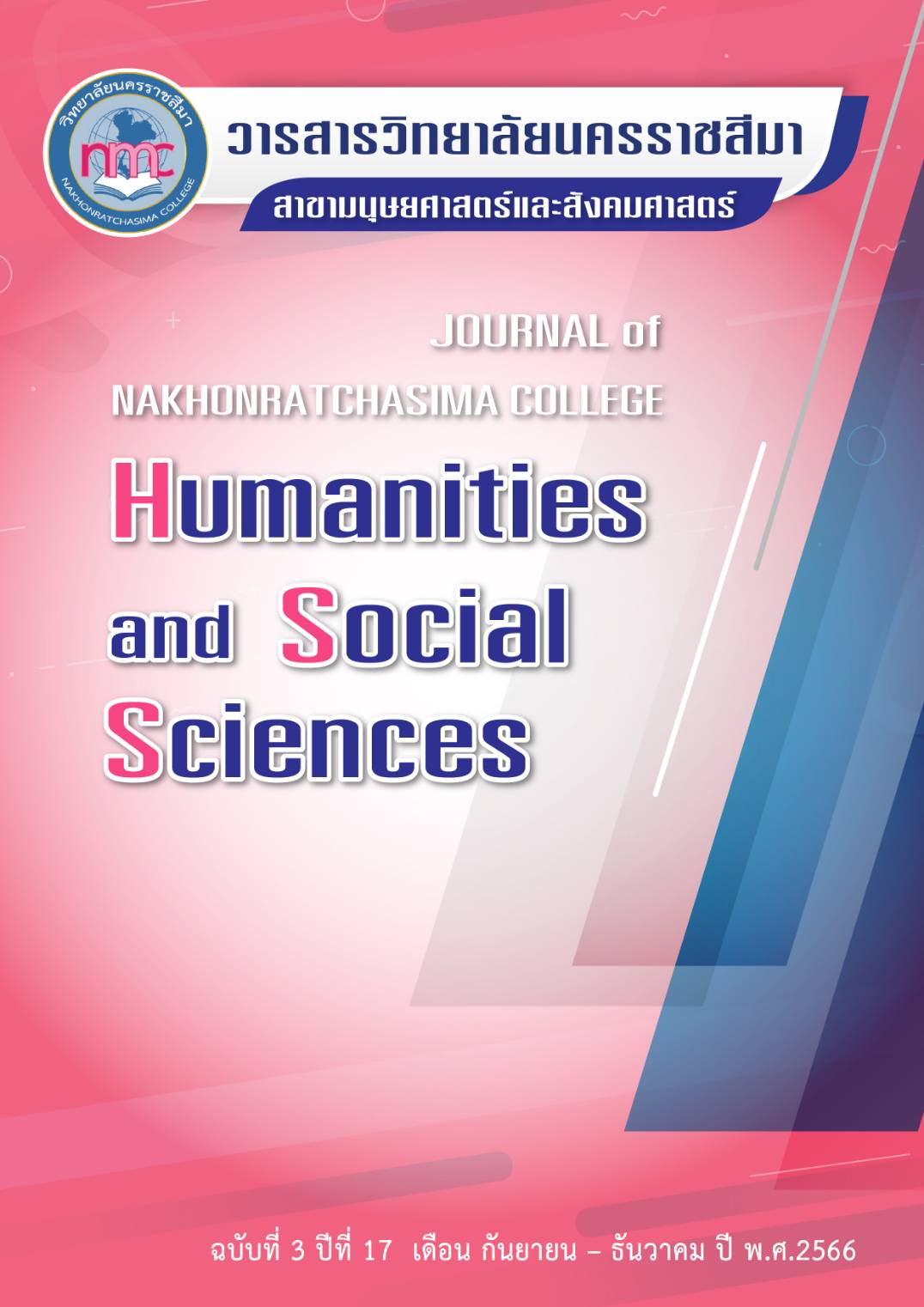An Analysis of the Influence of Music Aesthetics on the Emotional Management of University Students in Beijing, China
คำสำคัญ:
Emotional Management, Music Aesthetics, Music Quality, Social Relationshipบทคัดย่อ
The research on an Analysis of the Influence of Music Aesthetics on the Emotional Management of University Students in Beijing, China to aimed to (1) study the types of emotional illnesses of university students in Beijing, China, (2) examine the significant factors causing emotional illness in university students in Beijing, China, (3) explore and conduct an emotional management model for university students in Beijing, China, and (4) assess the model implementation for helping in the emotional management of university students in Beijing, China. The study was quantitative and qualitative research and used questionnaires and interview forms for collecting data.The questionnaires were launched to 415 students of the Minzu University of China in Beijing, China. The qualitative data was collected with an in-depth interview of 10 teachers and 15 students there. The data analysis using descriptive statistics whit mean and percentage analysis and the multiple regression.
The results show that ;
1. The revealed that most respondents were females, at the age of 21-25 years old, were born in other parts of the mainland, with a master’s degree in history and religious studies in the second year, having average monthly expenses between 2,501-3,000 yuan, having lived family with parents, having financial support for the study from their fathers without study congenital diseases, having hobbies and activities, and having listened a few times a week for 15-30 minutes.
2. The multiple linear regression model of emotional management was Emotional Management = 2.588 + 0.136MQ + 0.111SP + 0.0072SR + 0.072Apr. The study reveals Emotional Management as the dependent variable. It identifies Music Quality (MQ), Subjective Perception (SP), Social Relationships (SR), and Appreciation (Apr) as independent variables. These independent variables collectively predict ...
เอกสารอ้างอิง
Aablbers, S. et al. (2020). Efficacy of emotion-regulating improvisational music therapy to reduce depressive symptoms in young adult students: A multiple-case study design. The Arts in Psychotherapy Retrieved from https://doi.org/10.1016/j.aip.2020.101720
Andrews, D. (2019). Predictors of community college students’ academic success in the Corequisite Model. Georgia Southern University: Electronic Theses and Dissertations.
Archambault, K. et al. (2019). AP: A personalized receptive music therapy intervention to improve the affective well-being of youths hospitalized in a mental health unit. Journal of Music Therapy, 56(4), 381–402.
Erudera. (2022). China International Students Statistics. Retrieved from https://erudera.com/statistics/china/china-international-student-statistics/
Mayo Clinic. (2022). Mental Illness. Retrieved from https://www.mayoclinic.org/diseases-conditions/mental-illness/symptoms-causes/syc-20374968
Mayo Clinic. (2022). Diseases Conditions: Mental Illness. Retrieved from https://www.mayoclinic.org/diseases-conditions/mental-illness/symptoms-causes/syc-20374968
Morrison, W.M. (2019). China’s Economic Rise: History, Trends, Challenges, and Implications for the United States. CRS Report: Congressional Research Service.
OECD. (2022). Social and Emotional Skills: Well-being, connectedness, and success. Retrieved from https://www.oecd.org/education/school/UPDATED%20Social%20and%20Emotional%20Skills%20-%20Well-being,%20connectedness%20and%20success.pdf%20(website).pdf
Park, J. et al. (2023). Effects of music therapy as an alternative treatment on depression in children and adolescents with ADHD by activating serotonin and improving stress coping ability. BMC Complementary Medicine and Therapies, 23:73.
Rodriguez, R.M. et al. (2023). The value of music therapy in the expression of emotions in children with cancer. Hindawi: European Journal of Cancer Care. 910350: 1-14.
Rousseau, R. (2015). BRICS: What is meant by emerging countries? Diplomatic Courier. Retrieved from https://www.diplomaticourier.com/posts/what-is-meant-by-emerging-countries
Sun, J. (2022). Exploring the Impact of Music Education on the Psychological and Academic Outcomes of Students: Mediating Role of Self-Efficacy and Self-Esteem. Frontiers in Psychology 13:841204.
Textor, C. (2023). Number of public colleges and universities in Beijing, China from 2010-2022. Retrieved from https://www.statista.com/statistics/1139377/china-number-of-universities-in-beijing/
Textor, C. (2023). Number of students enrolled in tertiary education in China 1990-2022. Retrieved from https://www.statista.com/statistics/1114979/china-enrolled-student-number-in-tertiary-education/
Wang, S., and Aguis, M. (2018). The use of music therapy in the treatment of mental illness and the enhancement of societal well-being. Psychiatria Danubina, 30: 595-600.
Wang, T., Zhao, Y., and Yin, M. (2022). Analysis and research in the influence of music on students’ mental health under the background of deep learning. Frontiers in Psychology, 13:998451.
World Bank. (2019). World Bank per Capita GDP measurements.
Yamane, T. (1973). Statistics: An Introductory Analysis. New York: Harper & Row
ดาวน์โหลด
เผยแพร่แล้ว
รูปแบบการอ้างอิง
ฉบับ
ประเภทบทความ
สัญญาอนุญาต
จรรยาบรรณผู้เขียนบทความ
ผู้เขียนบทความต้องรับรองว่าบทความนี้ไม่เคยตีพิมพ์ในวารสารใดหรือสิ่งพิมพ์อื่นๆ มาก่อน ต้องไม่คัดลอกผลงานผู้อื่นมาปรับแต่งเป็นบทความของตน และไม่ได้อยู่ระหว่างการเสนอเพื่อพิจารณาตีพิมพ์ อีกทั้งยอมรับหลักเกณฑ์การพิจารณาและการตรวจแก้ไขบทความต้นฉบับโดยกองบรรณาธิการวารสารวิทยาลัยนครราชสีมา สาขามนุษยศาสตร์และสังคมศาสตร์
บทความทุกเรื่องได้รับการตรวจพิจารณาทางวิชาการโดยผู้ทรงคุณวุฒิที่มีประสบการณ์และมีความเชี่ยวชาญตรงตามสาขาของบทความ ซึ่งผู้เขียนต้องแก้ไขตามคำแนะนำของผู้ทรงคุณวุฒิภายในระยะเวลาที่กำหนด หากไม่เป็นไปตามกำหนดกองบรรณาธิการขอสงวนสิทธิ์และยกเลิกการตีพิมพ์โดยจะแจ้งให้ทราบต่อไป
ข้อความที่ปรากฏในบทความของวารสารนี้เป็นความคิดเห็นของผู้เขียนซึ่งไม่เกี่ยวข้องกับวิทยาลัยนครราชสีมาแต่อย่างใด และกองบรรณาธิการขอสงวนสิทธิ์ในการพิจารณาและตรวจประเมินบทความเพื่อตีพิมพ์ในวารสารของวิทยาลัยนครราชสีมา สาขามนุษยศาสตร์และสังคมศาสตร์



